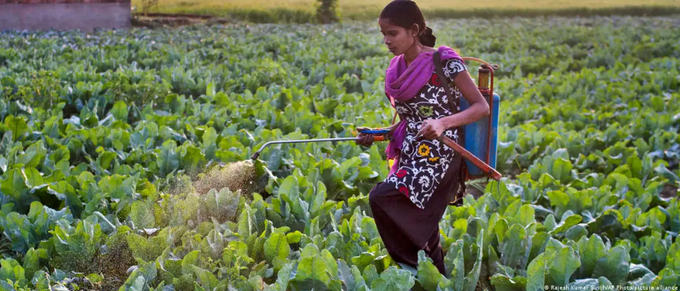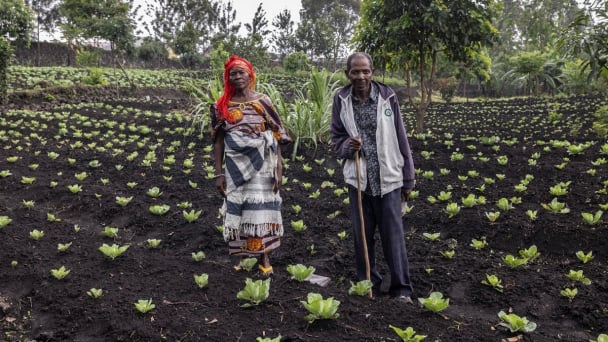April 15, 2025 | 23:00 GMT +7
April 15, 2025 | 23:00 GMT +7
Hotline: 0913.378.918
April 15, 2025 | 23:00 GMT +7
Hotline: 0913.378.918

Food growers have long relied on pesticides but what are the natural alternatives to toxic chemicals.
Since the dawn of agriculture, farmers have struggled to protect crops from pests.
In ancient Persia (current-day Iran), the natural insecticide Pyrethrum, made from dried Chrysanthemum flowers, was utilized to paralyze insects that attack edible plants — and later to kill hair lice.
But by the dawn of the 20th century, large-scale mono agriculture was relying on chemicals containing arsenic, sulphur or copper to deter pests from fruit, cereals and vegetables.
All those chemical pesticides have had a profound impact on ecosystems and human health. It is why some countries have banned them, and the EU has long threatened — but failed — to outlaw glyphosate, a controversial weedkiller that threatens biodiversity and has been linked to the development of cancer. But what's the alternative?
Biopesticides created with plant products like Pyrethrum, or with neem tree-based essential oils, or types of fungi that guard against pathogens, are rising in popularity globally as farmers shun chemical pesticides.
Neem, a tree common in India, contains a number of limonoids — often found in citrus plants and well-known for their insecticidal properties — that repel insects when applied as an essential oil.
The natural pesticide is effective, for example, in controlling locusts and stopping them from forming destructive swarms.
Essential oil made from rosemary has also proved to be highly repellent against aphids, which stunt and deform diverse cereal and vegetable species.
Meanwhile, one farmer in Tamil Nadu in southern India has ditched chemical pesticides that impacted his health for a spray he makes from cow urine and locally grown leeks. His organic crops are flourishing.
In a study published in December, Australian researchers showed how bluegreen aphids were becoming resistant to chemical insecticides — which was part of a worldwide trend, they added.
To break this resistance, the authors recommended non-chemical pest control alternatives, including the promotion of "natural enemies" such as ladybirds and parasitoid wasps.
Novel bacteria used to successfully manage mosquito-born disease are another option, according to the study. Rather than rely on universal chemical pesticides, the idea is to employ regionally specific solutions to pest control.
In Brazil, which is the biggest exporter of soy, strides are being made to create natural pesticides using organic fungi and bacteria.
The application of these natural microorganisms has proved beneficial, allowing soy crops to flourish while resisiting pests and disease.
Brazil is also a major exporter of corn and cotton and the number one consumer of chemical pesticide, according to the UN's Food and Agriculture Organization.
But despite the continued rise in chemical insecticide use, biopesticide sales have more than doubled in Brazil from 4% of total pesticide sales in in 2020 to 9% in 2022.
So-called microbial pesticides consisting of microorganisms like bacterium or fungus can control a wide variety of pests, according to the US Environmental Protection Authority (EPA).
The most utilized microbial pesticides are strains of the Bacillus thuringiensis bacteria that produces a mix of proteins capable of killing several related species of insect larvae.
Such biopesticides are not only less toxic than conventional pesticides, they limit their impact on the "target pest and closely related organisms," says the EPA.
This localized application contrasts to conventional pesticides that can affect diverse organisms such as birds, insects and mammals.
Biopesticides are also effective in very small quantities, says the EPA. Additionally, they decompose quickly, which reduces environmental exposure and the pollution associated with conventional pesticide.
Natural pesticides can also bring high crop yields, though one caveat will be how a shifting climate and rising CO2 in the atmosphere could shift the dynamic between certain plants and pests.
(DW)

(VAN) 169 lotus seeds selected by the Vietnam Academy of Agricultural Sciences were carried into space by Vietnamese-American astronaut Amanda Nguyen.

(VAN) Tariffs are making life more expensive for John Pihl. He's been farming in Northern Illinois for more than 50 years.

(VAN) European and American farmer organisations are concerned about the import tariffs that the United States introduced on 9 April for products from the European Union. This makes them 20% more expensive.

(VAN) Global poultry trade is expected to remain strong amid relatively tight global protein supply and growing consumption, RaboResearch concludes in its latest animal protein report.

(VAN) Traditional methods benefit hundreds of species but as new agricultural techniques take over, the distinctive haystacks mark a vanishing way of life.

(VAN) The nation’s top banks are quietly advising their clients on how to build a financial life raft - or perhaps life yacht - from the wreckage of runaway climate change.

(VAN) From FAO Office in the Democratic Republic of the Congo.